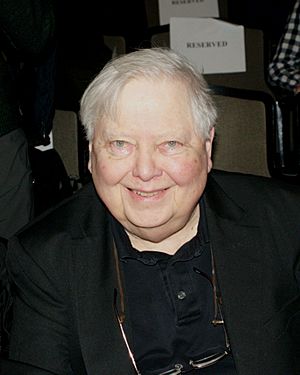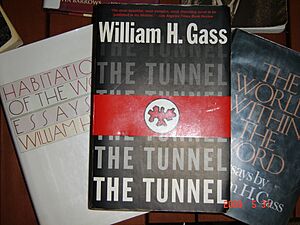William H. Gass facts for kids
Quick facts for kids
William H. Gass
|
|
|---|---|

Gass at the 2010 National Book Critics Circle awards
|
|
| Born | William Howard Gass July 30, 1924 Fargo, North Dakota, U.S. |
| Died | December 6, 2017 (aged 93) University City, Missouri |
| Occupation |
|
| Nationality | American |
| Alma mater | Kenyon College (AB) Cornell University (PhD) |
| Period | 1959–2017 |
| Genre | Creative nonfiction, metafiction |
| Literary movement | Postmodernism, metafiction |
| Notable works | The Tunnel, A Temple of Texts, Middle C |
William Howard Gass (born July 30, 1924 – died December 6, 2017) was an American writer and professor. He was known for his novels, short stories, and essays. He also taught philosophy at universities.
Gass wrote three novels and many collections of short stories and essays. Several of his books won important awards. For example, his novel The Tunnel won the American Book Award in 1996. His book of essays, A Temple of Texts, won the Truman Capote Award for Literary Criticism.
Contents
Early Life and School
William Howard Gass was born in Fargo, North Dakota, on July 30, 1924. His family soon moved to Warren, Ohio, a town known for steel. He went to school there. He later said his childhood was not very happy. His father was an architect but had to work as a high school teacher after getting hurt in World War I. His mother stayed at home.
As a boy, Gass loved to read everything he could find. He read from adventure stories like The Shadow to history books. He read all the time, even though there were no bookstores in Warren. He said that "pocketbooks" (small, cheap paperbacks) saved his reading life. He would save his money and buy as many as he could every two weeks. Even though he loved reading, his father did not approve of his dreams to be a writer.
After high school, Gass went to Ohio Wesleyan University. He did very well there, except for math. Then, he served in the Navy during World War II for three and a half years. He called this time one of the worst parts of his life.
After the Navy, he earned a degree in philosophy from Kenyon College in 1947. He then went to Cornell University. By 1954, he earned his PhD in philosophy. At Cornell, he studied with famous thinkers. His main project was about how we use language. He was also inspired by the writer Gertrude Stein.
Teaching Career
Gass taught at a few different colleges. He taught at The College of Wooster for four years. Then he taught at Purdue University for sixteen years. Later, he became a professor at Washington University in St. Louis in 1969. He taught there until he retired in 1999. Some of his co-workers at Washington University were also famous writers. After 2000, he was a professor emeritus, meaning he was retired but still honored by the university.
Family Life
In 1952, William Gass married Mary Pat O'Kelly. They later divorced. They had two sons, Richard and Robert, and a daughter, Susan.
Later, Gass married Mary Henderson Gass, who was an architect. They had twin daughters, Catherine and Elizabeth. Catherine is an artist and photographer.
Writing and Books
While teaching at universities, Gass also started publishing his stories. Many of his short stories were chosen for The Best American Short Stories collections.
His first novel, Omensetter's Luck, came out in 1966. It was about life in a small Ohio town in the 1890s. Critics loved his amazing use of language. They called him an important new writer. One critic said it was "the most important work of fiction by an American in this literary generation."
In 1968, he published In the Heart of the Heart of the Country. This book had five stories about people feeling alone and how hard it is to love. That same year, he released Willie Masters' Lonesome Wife. This was an experimental novella with photos and different text styles. It was meant to help readers think about stories in new ways.
Gass also wrote several collections of essays. These included Fiction and the Figures of Life (1970) and Finding a Form (1996). His book of novellas, Cartesian Sonata and Other Novellas, was published in 1998. His novel Middle C came out in 2013. His essays also appeared in The Best American Essays collections.
Even though he wrote a lot, Gass said writing was hard for him. For example, his long novel The Tunnel, published in 1995, took him 26 years to write! He once said, "I write slowly because I write badly. I have to rewrite everything many, many times just to achieve mediocrity."
When The Tunnel was released, many critics praised it. One called it "a stupendous achievement and obviously one of the greatest novels of the century." Another critic from the Los Angeles Times said he read it many times and was amazed by its beauty and complex ideas. In 2006, an audio version of The Tunnel was released, read by Gass himself.
Gass paid a lot of attention to how he built his sentences. His writing style has been called flashy, difficult, sharp, masterful, creative, and musical. Some critics called him "the finest prose stylist in America." Much of his work is metafictional. This means his stories often talk about the act of writing itself. Gass joked that he wasn't "Postmodern" but more like "Late" or "Decayed Modern."
Major Books
Omensetter's Luck (1966)
This was William Gass's first novel. It tells the story of people in a small Ohio town in the 1890s. Their lives change when a man named Brackett Omensetter arrives. He has conflicts with a strange preacher, which stirs up the whole community. Harper's described it as "A rich fever, a parade of secrets, delirious, tormented, terrifying, comic...one of the most exciting, energetic and beautiful novels we can ever hope to read."
The Tunnel (1995)
The Tunnel is a novel about a man named William Frederick Kohler. He is trying to write an introduction for his big history book about "Guilt and Innocence in Hitler's Germany." But instead of just writing an introduction, he starts writing a very personal book about his own life. As the story goes on, we see his lies, half-truths, strong feelings, and the messy parts of his past. While he digs into his memories, he also starts digging a real tunnel from his basement. This tunnel is a symbol of him digging deep into himself. The novel explores ideas about history, evil, and life and death.
Middle C (2013)
Middle C is the story of Joseph Skizzen. He is a regular professor living a regular life in Ohio. His father had moved the family out of Austria before World War II by pretending they were Jewish. During the war, his father disappeared, and the rest of the family made it to Ohio. As an adult, Skizzen lives with his mother and has a rich fantasy life. He dreams about his "Inhumanity Museum" and the composer Arnold Schoenberg.
Awards and Recognitions
William Gass received many awards and honors throughout his life. He got grants from important groups like the Rockefeller Foundation and the Solomon R. Guggenheim Foundation. He won the Pushcart Prize multiple times. In 1994, he received the Mark Twain Award for his contributions to literature in the Midwest.
In 1959, he won the Longview Foundation Prize for Fiction for his story "The Triumph of Israbestis Tott." In 1973, a poll by the Chicago Tribune named him one of the ten best American writers. He also received teaching awards from Purdue University and Washington University. In 1975, he won the American Academy and Institute of Arts and Letters Award for Fiction.
He received the Lannan Lifetime Achievement Award in 1997. In 1996, he won the American Book Award for The Tunnel. In 2000, he was honored with the PEN/Nabokov Award and the PEN/Nabokov Lifetime Achievement award, which he called his "most prized prize."
Gass won the National Book Critics Circle Award for Criticism three times for his essay collections: Habitations of the Word (1985), Finding a Form (1997), and Tests of Time (2003). He also received the PEN/Diamonstein-Spielvogel Award for the Art of the Essay for Test of Time in 2003. In 2007, he received the St. Louis Literary Award.
In 1990, Gass started the International Writers Center at Washington University. This center aimed to support writers and connect them with readers around the world. He also showed his photography in many presentations. He has a star on the St. Louis Walk of Fame. He was also on the editorial board of the literary magazine Conjunctions. In 2006, William H. Gass was a special speaker at the &NOW Festival and the Lake Forest Literary Festival.
In the science fiction novel Hyperion by Dan Simmons, William Gass is called "the twentieth century's most honoured writer."
More recently, Gass won the 2007 Truman Capote Award for Literary Criticism in Memory of Newton Arvin. This award is chosen by a group of six authors and comes with a $30,000 prize. Gass won it for his 2006 collection of essays, A Temple of Texts.
Images for kids
See also
 In Spanish: William H. Gass para niños
In Spanish: William H. Gass para niños




